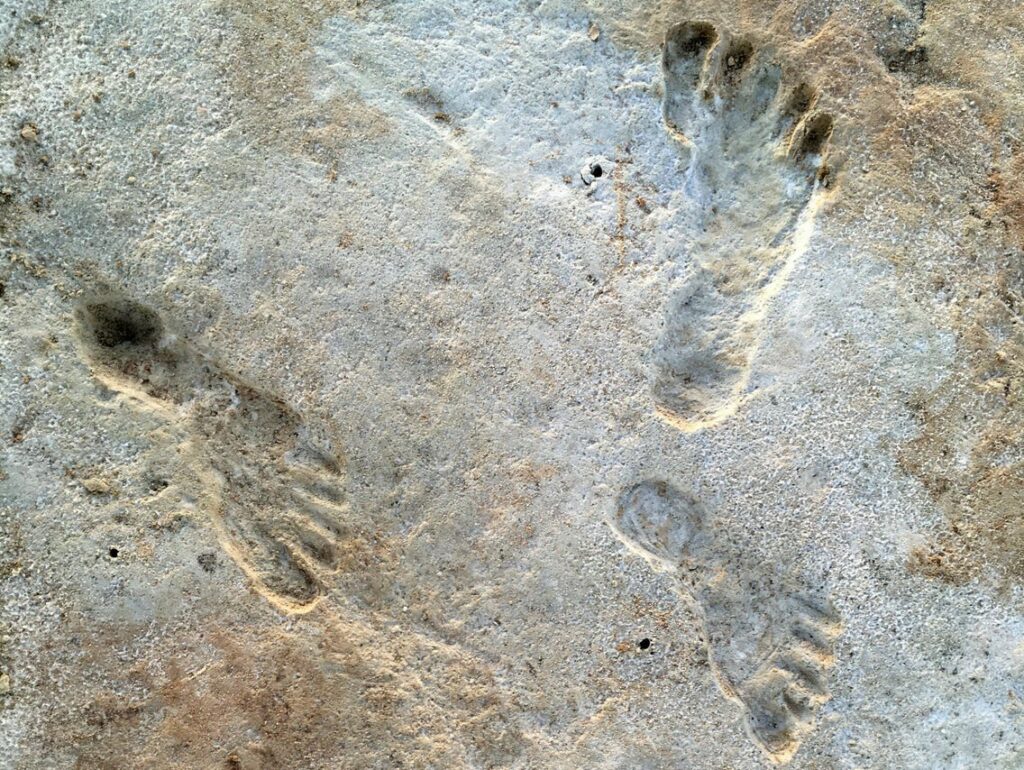
While walking this past week I noticed whitish imprints on the bike path, the result of muddy water having collected under wet leaves that had dried once the sun came out and had blown away. Evanescent, such imprints will disappear quickly, and it got me thinking about what we leave behind.
Few of us will leave imprints as distinct and long lasting as those recently found in fossilized mud flats calculated at 43,000 years old, but each of us will and do leave imprints on the world. Although our bodily remains are destined to become just another pile of skull and bones, the actions we undertake in life – our thoughts and deeds – are like ripples in a pond, moving outwardly in all directions and interacting with ripples produced by others.
The Hindu and Buddhist conception of Karma points to imprints and recognizes the complexity of interdependence; our actions reverberate, some perhaps only for an instant, but others for many generations. When such reverberations mix and match with others, resonance emerges in what we commonly observe as cultural events and social trends.
The study of epigenetics reinforces the significance of such resonance. Epigenetics is the study of how and why genes switch on and off, the ways in which events and actions effect who and how we are. It reveals, for example, that the physical and emotional stresses of war and famine resonate through successive generations, affecting the lifespan not only of children, but grandchildren and their children. The epigenetic/Karmic effects of how we think and act is real, and in this way we each leave our imprint on the world.
The greats of the Axial Age, the era during which the Buddha, Jesus Christ, Mohammed, and other notable religious figures emerged, left imprints on the world still resonating powerfully today. At that time the written word was new and relatively few knew how to read and write. The transmission of ideas was direct, an oral tradition of spoken words. This created a generation of those who actually heard the words when spoken, and who later wrote them down for the edification of later generations. Depending upon whom you ask, these teachings are truth or mythology, but in either case represent a deeply significant legacy of thought and action affecting billions of people.
In its immediacy, life often obscures the legacy of our actions, masking the imprints we leave behind. Events follow quickly on the heels of others, creating the impression that each of us are simply at the mercy of the world, like leaves blown by the wind. In this way, we can lose track of the fact that we ourselves are the wind that moves. Having externalized the living experience, we are swept up by the ripples and resonances created by others. This is precisely the result systems of economic exploitation engender and why our modern lives are saturated with advertising and commercialism intended to make us lose sight of our own choices of action.
We do have choice, however, and being mindful of what we say and do, efforts admittedly challenged by ever more sophisticated technologies of group think and distraction, remains an option. And, although it’s impossible for us to know all the ways in which the imprints of our lives will affect others, it’s a pretty safe bet that good begets good.
This really resonates with me, Larry. A good reminder that our lives are not just at the whim of every which way the wind blows. We do have choices.
Thanks, Roberta…
We will possibly leave behind:
Love for some and contempt of others
Respect for all those that have and are still serving
community programs and community needs
Commitment to one another to respect each other’s
backgrounds and needs
Thanks, Stanley. Good to hear from you.
lives of great men oft remind us
we can make our lives divine,
and, departing, leave behind us
footprints on the sands of….